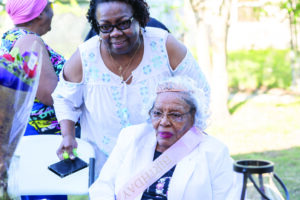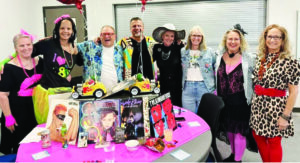Breast-feeding advocates speak on formula crisis

by NAYABA ARINDE Amsterdam News Editor
Seemingly lost in the ‘baby formula shortage’ crisis, is the whole axiom of “breast is best.”
Like a scenario from a B movie, mothers are scouring store shelves across the nation looking for the milk powder to feed their children. Social media is abuzz with tips on how to score cans of formula from all over the country.
With the nation sitting in a recession; gas prices shutting down needed vehicles; the U.S sending billions upon billions to Ukraine in the NATO-linked war with Russia; and a random 18-year-old terrorist white boy murdering 10 shoppers and a security guard at a Buffalo supermarket; moms nationwide are in despair as an alleged bacteria outbreak at a formula-producing factory, and a pandemic-era glitching the supply chain, has led to a baby formula shortgage. This has led some to find empty shelves, and others being rationed to as few as two cans.
News clips galore show mothers pleading for resolution. A barely whispered conversation yet being held, is that of mother’s milk is best.
Why one company is the major connect and provider of formula for those who use it, is another issue altogether. Abbot Labs is now telling the government that after it passes inspection, it will take about two weeks to get up and running again, and four weeks after that for their product to pass on to distributors and hit the shelves.
“They don’t advocate breast feeding children anymore. They even give you formula in the hospital.They could give women breast pumps too,” said Santina Payton-Brown, Committee to Honor Black Heroes member. The Brooklyn community activist is a mother of four, and a grandmother of four, and 17 by marriage, “My mother had 20 children and she breast fed us all, that’s why we didn’t have any medical complications,” said the seventh girl, and 12th child. “Sometimes they tell women if they breastfeed they can’t get WIC assistance [Women Infants Children, food for mothers with babies]. If you don’t know, they can tell them anything.
“I would ask women if they could at least try it for the first three months, to make your immune system strong. I breastfed my children, and my body was able to come back to itself, even after my three c-sections.”
Repeating a common refrain, Payton-Brown said, “We the only mammals who feed our babies another animal’s milk. Animals feed from their parents. We should ours. It helps you bond with your babies. Breast milk is full of nutrients. It helps with the respiratory system and helps the brain from being overly imbalanced; formula does not have the same benefits. Our breastfeeding builds the immune system of the babies. I have four healthy children. My daughter was close to six when we had a wean-off breastfeed party.”
Nursing mothers often swear by the experience, with all the starter-stories, pumping, engorgement, typical issues notwithstanding.
Mainstream news though is only focusing on the shortage of baby formula.
The New York Times reported that the Michigan Abbott Nutrition factory recently shut down. This, after four babies may have contracted a rare bacterial infection having had formula produced there. Two of the babies died. While it has not been established that the formula was the cause of the infections, the shutdown raised questions.
“Three companies—Abbott, Gerber and Reckitt—make nearly all of the formula that Americans use. Abbott is the largest of the three, with roughly 40% of the market,” said the Times.
Common now, but formula was not always present in the homes of infants and newborns. Caribbean and Continental African women tell now of how they remember mothers using diluted evaporated or Carnation milk to feed babies decades ago. Many mothers speak now on how formula was not an option, choice and prohibitive cost being some of the reasons.
Some families are convinced by the convenience of it, but others just have not trusted the pushed powdered milk. It’s in the name, they said. Formula. What is in it? Some question the ingredients. One of the urban stories is that of the estrogen levels in the compounds which make up the pseudo-powdered milk. The debate has been reignited.
It is not mother versus mom, but it could be socio-economics, culture, philosophy, politics, and dietary concerns, in a long-term conversation.
Formula advocates site convenience and belief in the product. They are not tied to a personal feeding or pumping schedule. Child care may not necessarily be tied to their own availability in terms of having to personally feed their infant.
Meanwhile, there have long been calls to give nursing moms returning to work the assistance and space to pump milk. While there are Lactation Stations in many municipal buildings, many workplaces do not have them, and women do not want to have to use the bathroom as a substitute space for that purpose.
In March 2014, Bed Stuy (former) City Council Member Robert Cornegy opened a Lactation Station in his suave office in Restoration Plaza. The father of six, including twins, Cornegy told the AmNews then, “I just thought about the experience my wife, Michelle, encountered when she had to nurse our boys, and while a mother is able to nurse where and when she needs to—and she should—I was excited to be able to provide a safe and secure room where mothers can come in off the street and feed their babies.”
Cornegy said his community lactation station was created to facilitate and promote breastfeeding for working mothers and Central Brooklyn residents. “Breastfeeding reduces a mother’s risk of breast and ovarian cancers. Breastfeeding also reduces an infant’s risk of ear, respiratory and gastrointestinal infections and asthma, and promotes maternal bonding and optimal growth and development.”
Current 36th District City Council Member Chi A. Ossé, 24, said that the Lactation Station is still fully functional. “Breastfeeding can be a moment of vulnerability in many conditions, especially cold weather. Further, many mothers seek privacy while breastfeeding, which can be difficult to find while out in public. Our office exists to serve our neighbors in many capacities, ranging from food distribution to housing assistance. One of the capacities in which we can be of service is to provide mothers with this particular sanctuary, as well as cold storage for milk.”
“I breastfed all of my three children—two daughters and a son. I saw my mom breastfeed my youngest sister, and I always knew breastfeeding is best because whatever immunity you had, you pass it on to the child,” said attorney Casilda E. Roper-Simpson, a mother of three, and grandmother of five “with one on the way.”
She reminisced, “It was not just about convenience, because yes, I didn’t have to get up and make a bottle. My husband would get the baby, and I would just feed the baby.”
There are the known positive side effects of breastfeeding too, the lawyer added. “The tightening of the uterus is another plus. It helps the body get back into shape after carrying a child in your body for almost a year.”
With full transparency, she also said, “Initially I was frustrated by the process. I didn’t know if I was doing it right—nothing was coming out. My mom told me how to comb my breast, and so I did. There was so much milk I could feed all the children in the country.”
A thought suddenly crossed her mind when she told the Amsterdam News, “Black women used to be used as wet nurses for the enslavers’ children. They weren’t pushing alternative milks then.”
Proud of her own grown-up family, with a second generation in the making, happily she said, “You bond as your baby looks at you. How much closer can you get? If you can’t produce milk, it is understood, then you have to explore other options.”
Expensive formula in the 1990s also took the option off of the table for her, Roper-Simpson noted.
“I couldn’t afford it with my first daughter. Back then I think it was about $20. We couldn’t afford it. I was a young secretary temping, and my husband worked at an alarm company. We always had Carnation milk, but they said don’t make anything at home. But, I thought ‘Why not?’ Back then we had Carnation milk and cornmeal pap.”
“When I took my daughter off the breastmilk and tried to give her formula, she had a reaction to it, and they put her on soy. They wanted to look at her gastrointestinal system, but she was actually just allergic to the formula.”
“I nursed both my sons, but near the end I stopped with my youngest because he had an issue with swallowing. But, I used natural alternatives—rice milk, almond milk—but never cow’s milk. I soak almonds and blend them. These so called trendy alternative milks are usually junk,” said Joan Lorraine, cosmetologist, esthetician, body and skin-care specialist. “Breastfeeding is so much better. It helps the womb heal, and helps the woman’s body heal. I don’t understand why wouldn’t want to, unless you can’t. Yes, it’s painful, at first. But, what isn’t.”
Maxine was a 20-something mother of a newborn boy and girl. “What do I do?” she cried almost in despair. Luckily, she was surrounded by her mom and a great circle of girlfriends. “Feed your beautiful twins,” they said. “You have all you need right with you!” There was gentle coaxing, sharing of experience and information, and the nursing mom overcame her initial fear and concern, and was breastfeeding like a champion within days.
Assemblywoman Stefani Zinerman told the Amsterdam News, “There are Lactation Stations in all municipal buildings, so if you’re doing business with the city or state. But we are not doing any education on why it is important for baby’s and women’s health.”
Member of the Task Force on Women’s Issues, Legislative Women’s Caucus, Task Force on Women’s Issues, the Committee on Agriculture, and the Black, Puerto Rican, Hispanic & Asian Legislative Caucus, among others, Zinerman said, “I have all these intergenerational conversations, with grandmothers and mother, where we talk about theme not trying to shame their daughters in their choices.”
Saying that she herself gave her daughter formula, after nursing for some weeks. “ I had trouble for a bit, and I didn’t have the wrap-around support. It is my one regret as a parent.”
Women approach pregnancy, birth, and rearing children differently.
Zinerman said, “We need more public awareness. Our health department should be compelled to have ongoing health and wellness programs in our state.
“We are also pushing for more insurance for women who request midwifery and doula services.”
She spoke on what she called the “generational and cultural differences. My mother used Carnation milk in the ’60s. Then there was this new forward movement where they pushed formula, saying that that is what women should feed their babies, because it was more professional, and it signified upward mobility if they didn’t breastfeed. But, they ended up losing money because of the cost of formula.
“It needs to be part of the curriculum in schools. We should talk about the first food when talking about food they should be eating. The nutrients in breast milk are superior to any other type of milk. There are no artificial additives, or food coloring, or anything. We are the only mammals who use other mammals to feed their offspring.”
There are lots of practical issues as to why nursing should get mainstream focus, Zinerman said. “Also, when cost becomes an issue, a woman may go to the dollar discount store, and end up buying expired formula, and unknowingly introduce other illnesses and allergies to their baby.
And we need to get our men involved in this conversation too, because they need to understand that the aesthetic some of them say they prefer can affect the decision a woman may make about feeding their newborn.”








